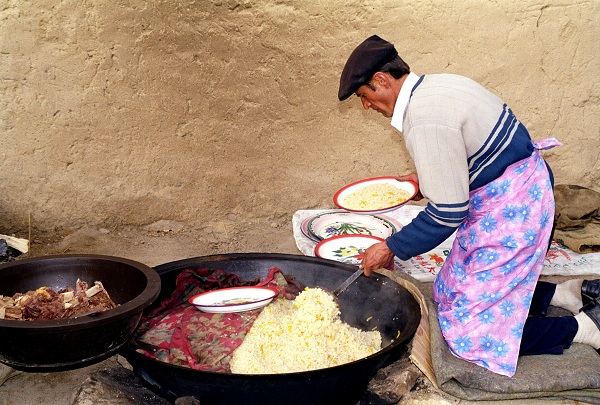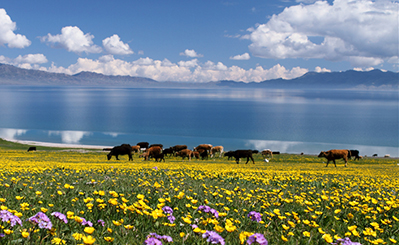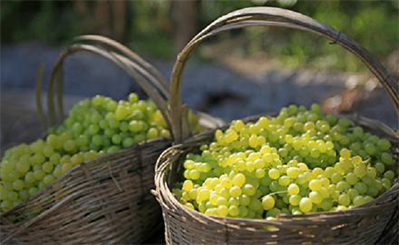Rural vitalization inspires ethnic Tajik wedding celebrations

A villager prepares food for the Tajik wedding celebrations. [Photo/IC]
"Happy wedding!" A rousing cheer burst out at a distinctive wedding ceremony featuring ethnic Tajik traditions, where Gulihan Zangabili and her better half tied the knot.
Lasting for three days, the vibrant and joyful event in Fumin village brought vigor and happiness to the villagers living on the Pamir Plateau, in the far west of Northwest China's Xinjiang Uygur autonomous region.
For the 25-year-old ethnic Tajik bride and her groom Marmathan Tirmur, having fallen in love more than three years ago, a traditional wedding ceremony was at the top of their to-do list.
"Now our standards of living allow us to choose many ways to perform our wedding, but we still prefer to do so with such a traditional ceremony," said the groom.
Inscribed on the national intangible cultural heritage list in 2008, the wedding customs of the Tajik ethnic group maintain unique traditions and are always described as festivals of music, dance and food to showcase the resplendent newlyweds and their propitious marriage.
Last month, without a hair out of place, Gulihan Zangabili, dressed head to toe in traditional costume and adorned in a veil of red and white, married Marmathan Tirmur, describing the wedding as a dream come true.
During the wedding, the traditional costume-clad groom had his face painted with traditional makeup and adorned with over 60 white dots, symbolizing good luck.
Throughout the festivities, the couple's loved ones from nearby villages joined in the celebration. Some of them played traditional Tajik musical instruments, such as the eagle flute and tambourine, and performed inspiring festive dances, while others lent their hands to prepare local specialties, including naan bread and pilaf.
Such events' long-lasting atmosphere of joy, harmony and warmth, which fills every moment and leaves every participant thoroughly immersed and captivated, draws not only locals but also tourists from across the country to the small village, to share in the joy and happiness together.
"The wedding is really special and lively, and we are lucky to see such an impressive ethnic wedding in Xinjiang," said a tourist surnamed Huang, from Beijing, dazzled by the splendid ceremony.
Sultanbagim Yiblayim, 61, Gulihan Zangabili's mother-in-law, could never imagine the booming popularity of their traditions and ballooning tourism.
"When I got married, it took me about seven days to get to my husband's house in another village on horseback. This seems inconceivable today."
Nowadays, automobiles have replaced horses as the most common means of transportation for the villagers.
The road network between the villages and counties is also improved, and it takes less than 20 minutes to drive from Fumin village to the county seat of Tashikurgan Tajik autonomous county.
While enjoying the convenience of modern life, ethnic Tajik people also choose to stick to some traditions.
Gulihan Zangabili's family bought a brand-new washing machine and a refrigerator for the couple as wedding gifts, along with handmade embroidery decorated with patterns such as fire and the sun, which represent ethnic Tajik people's love for nature.
According to the rural vitalization bureau, the local government in 2017 started to implement the Tatikuli relocation project, helping more than 1,400 farmers and herdsmen in five townships of the county move into new houses near the county seat from remote mountainous areas.
"Because of the continuous progress of rural vitalization work, the quality of life of the villagers has been greatly improved compared with before," said Elken Yusain, head of the bureau.
Brimming with bliss, Marmathan Tirmur said that because of the opportunity created by the relocation project, his wife moved from her birthplace — a small and remote village in the mountains, to Fumin in 2018 — and that's when the two met and got to know each other.
"Thanks to the relocation policy, we were given more opportunities than we would have had otherwise," he said.
"If it weren't for relocation, it would have been very difficult for the couple to meet, let alone make such a good marriage," said Zangabili Mainik, the bride's father.
 Attractions
Attractions Dining
Dining Culture
Culture